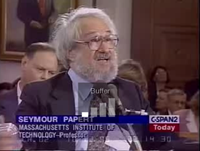
C-Span has now made 23 years worth of video, everything they have broadcast – 160,000 hours, available online. (Read NYTimes article) That means that some of my favorite public policy discussions, author interviews and political fireworks can be accessed and shared on-demand. The entire programs may be embedded in other web pages and an awful lot of the programs may be edited via a browser for embedding excerpts in blogs and web pages.
This is an amazing resource for teachers, learners and citizens. From time to time, I will share some of my favorite C-Span moments via this blog.
In October 1995, the House Committee Economic and Educational Opportunities and House Science Committees held a nearly three-hour hearing to examine “technological advances in education.” The first two hours or so of the hearing are a real hoot (as the kids on Capitol Hill say).
The first panel consists of the father of educational computing, Dr. Seymour Papert; Alan Kay, the inventor of the term “personal computer” and many of its accompanying technologies; an Wall Street guy who gave a lot of money to the Clinton Campaign; and Chris Dede.
Papert starts off like he was shot out of a cannon. Alan Kay says that he agrees with Seymour and then throws gasoline on the fire. The Wall Street stiff decides to argue with Dr. Papert while the Congress bangs the gavel in an attempt to restore order.
The discussion is well worth two hours of your time if you care about the edtech or the future of education.
I remember seeing the hearing when it first aired and have cherished a 3rd generation VHS recording. Now I can share it with you and my students via the Web! The Daily Papert has also transcribed the hearing so it may be preserved for future scholarship.
When I originally watched the hearing, back in 1995, I remember thinking that the members of the Congressional Education Committee may not be our nation’s best and brightest. Watch the hearing today and you can’t help notice that naughty underage male Congressional Page sexting aficionado, Mark Foley, plus convicted felons, Duke Cunningham and Chaka Fattah, interrogating some of the most thoughtful educational thinkers in the world.
If the video does not appear, please use this link.
Veteran educator Gary Stager, Ph.D. is the author of Twenty Things to Do with a Computer – Forward 50, co-author of Invent To Learn — Making, Tinkering, and Engineering in the Classroom, publisher at Constructing Modern Knowledge Press, and the founder of the Constructing Modern Knowledge summer institute. He led professional development in the world’s first 1:1 laptop schools thirty years ago and designed one of the oldest online graduate school programs. Gary is also the curator of The Seymour Papert archives at DailyPapert.com. Learn more about Gary here.

This Internet thing. It’s going to be big someday. ;o)
Seriously though…thanks for the link. While I cringe a bit at the expression Lehman uses, “we stand on the shoulders of giants”, I do believe that the best thing we have in this “Web 2.0” world is the ability to connect people with people instead of people with things.
Thanks for keeping these folks on our radar…and thanks to CSPAN in this case for bring it forward.
Close your eyes and it’s easy to think this panel convened yesterday, including the insipid, irrelevant, idiotic responses from the legislators in the room. What an embarrassment.
Gary–
Thanks for sharing! So many great quotes in that video and I’m glad I have a point to reference when I want to go back.
As school systems are facing massive layoffs and seem to be in a huge downward spiral on a systemic level (still lots of great teachers doing great things in individual schools and classrooms. Thank goodness.) you have to wonder how prescient Papert was in equating school system reform to the last years of the Soviet Union’s “command driven” economy. We’re still jiggling the parts, but are too close to the problem to see the futility of attempting national standards or dictating how learning takes place with individual humans.
For 20/20 hindsight amusement I love the part at about 73:00 in where the Wall Street dude scolds Papert for “representing to Congress that a $100 laptop is somehow feasible in the future”. The look on his face is priceless.
Finally, while I know you are skeptical about the very notion of Web 2.0 it would seem that Alan Kay makes the case rather strongly for the kind of individualized learning that widely-available books have made possible for the last hundred years or so (learn at your own pace, pursue your own interests) and that now is enhanced with people using social networking tools as a learning platform. Same concept. Different century.
Kim
Kim,
Thanks for posting. I’m not sure Kay would be all that impressed by much of what is called Web 2.0.
In fact, lots of what is presented as Web 2.0 learning may be at best, Web 2.0 teaching.
The fact that Daddy Warbucks is offended that children could REPAIR computers is fantastic. We had kids doing that 25+ years ago as certified technicians. Papert of course goes for the jugular and says that kids should MAKE the computers as well – an idea he maintained from the 60s.
Gary
PS: Will, you’re so radical 🙂